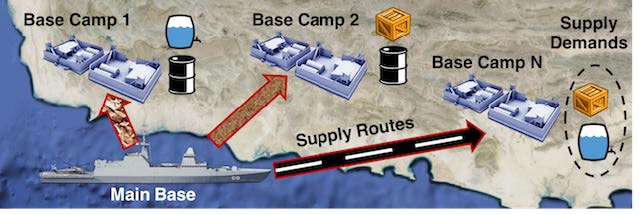Systems of Systems & Integration
Annual PlanStrategic Adaptive Vehicle Systems Feasibility Study
Project Team
Principal Investigator
Bogdan Epureanu, University of Michigan Panos Y. Papalambros, University of MichiganGovernment
Richard Gerth, U.S. Army GVSC
Ra’ed Seifeldin, Robert Maline, ONR
Industry
Mark Rupersburg, General Dynamics Land Systems
Student
Emrah Bayrak (post-doc), Mert Egilmez (post-doc), Xingyu Li, Arianne X. Collopy, Chad Wilson, University of Michigan
Project Summary
Project was completed across several phases/add-ons from 2013 - 2017

Military vehicles are designed and built to perform in a variety of mission environments and scenarios. As such, their performance requirements under some operating conditions often compete with other requirements under different conditions. Moreover, the available technologies and demands placed on these vehicles change over time, and new environments pose new requirements with respect to logistics, cost, deployment speed, safety and performance. To meet these challenges, the Army operates a variety of vehicles and maintains fleets composed of vehicle mixes appropriate for the expected needs at expected operational theaters. Such expectations are not static and the appropriate fleet inventory and vehicle mix change frequently. Maintaining high inventories and changing vehicle mix to match operational needs result in high costs, possible delays and inadequate availability of vehicles at a particular time.
The commercial vehicle sector has the same problem, in terms of quickly changing market needs. Manufacturers have addressed this using product platforms and modularization. A product platform is defined as the set of components and manufacturing and assembly processes that are common in a family of products. From the platform, module variants can be designed to achieve high product variety. Commonality reduces costs but, in general, may require some sacrifice in individually optimized product performance. The design challenge is how to optimize a family of products with maximum commonality while controlling individual performance requirements and product differentiation. Modular design can serve in controlling these tradeoffs. In a modular design process, units (or subsystems) are created to perform discrete functions and they can be connected in a variety of combinations to provide a variety of functions. Both platform-based design and modular design must include manufacturing and logistics to assess and realize the overall cost benefits.
The research objective was to create a modeling and simulation environment for a vehicle fleet built in a modular fashion that will allow us to assess cost and benefits of modularity while meeting the needs of specific operational scenarios. This exploratory research focused on high-level decisions, assuming that the technology required achieving the specific physical modularity will be developed in future studies.
Publications
- Bayrak A. E., Egilmez M. M., Kuang H., Li X., Park J. M., Hu J., Papalambros P. Y., Epureanu B.I., Umpfenbach E., Anderson E., and Gorsich D., “A System of Systems Approach to Strategic Feasibility of Modular Vehicle Fleets” IEEE Transactions on Systems, Man and Cybernetics, pp 1-13, 2018.
- D’Souza K., Bayrak A. E., Kang N., Wang H., Altin B., Barton K., Hu J., Papalambros P., Epureanu B., and Gerth R., “An Integrated Design Approach for Evaluating the Effectiveness and Cost of a Fleet”, Journal of Defense Modeling and Simulation, Vol. 13, No. 4, pp. 381–397, 2016.
- Bayrak A. E., Collopy A. X., Epureanu B., and Papalambros P., “A Computational Concept Generation Method for a Modular Vehicle Fleet Design”, In Proceedings of 2016 IEEE International Systems Conference, Orlando FL, April 18-21, 2016.
- Egilmez M. M., Park J. M., Bayrak A. E., Epureanu B., and Papalambros P., “Effects of Supply Route Characteristics on Modular Military Fleet Operations”, 2016 International Conference on Production Research Regional Conference Africa, Europe and the Middle East and 4th International Conference on Quality and Innovation in Engineering and Management, Cluj-Napoca Romania, July 25-30, 2016.
- A. E. Bayrak, M. Egilmez, H. Kuang, L. Xingyu, J. M. Park, P. Papalambros, B. Epureanu, E. Umpfenbach, R. Gerth, J. Dash, D. Gorsich, E. Anderson, “MARVEL - A Modular Vehicle Fleet Simulation Tool”, Proceedings of the 2015 Ground Vehicle Systems Engineering and Technology Symposium (GVSETS), Novi, MI, Aug 4-6, 2015.

